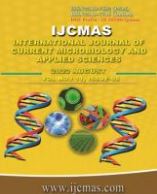


 National Academy of Agricultural Sciences (NAAS)
National Academy of Agricultural Sciences (NAAS)

|
PRINT ISSN : 2319-7692
Online ISSN : 2319-7706 Issues : 12 per year Publisher : Excellent Publishers Email : editorijcmas@gmail.com / submit@ijcmas.com Editor-in-chief: Dr.M.Prakash Index Copernicus ICV 2018: 95.39 NAAS RATING 2020: 5.38 |
Ginger (Zingiber officinale) is a medicinal plant that has been used extensively as spices in food and drinks and as an antimicrobial agent against various pathogenic organisms. The antimicrobial effect of ginger extract (ethanol, methanol and chloroform) against Pseudomonas and Klebsiella spp were investigated using agar well diffusion method. The results obtained from the study showed that the organisms used for the analysis were susceptible to the extracts except chloroform ginger extract that was unable to inhibit the growth of Klebsiella spp. Ginger ethanol extract had more inhibitory activity on Pseudomonas with the highest zone of inhibition (25 mm at 200 mg/ml) when compared to Klebsiella spp (22 mm at 200 mg/ml). The methanolic ginger extract had lower inhibitory activity (20 mm) on Klebsiella and (21 mm) on Pseudomonas spp when compared to the ethanol extract. Chloroform extract was the least in suppressing the growth of Klebsiella spp (10 mm at 200 mg/ml) and Pseudomonas spp (19 mm) at the same concentration of 200 mg/ml. MIC of ginger extracts on the organisms ranged from 6.25 mg/ml to 12.5 mg/ml for ethanol and methanol extracts except for chloroform extract that ranged from 0.00 to 6.25 mg/ml. The MBC was determined and Klebsiella had MBC at 3.125 mg/ml for ethanol and methanol extracts except for chloroform extract that were non inhibitory. Pseudomonas had MBC at 1.56 mg/ml for ethanol and methanol extracts and 12.5 mg/ml for chloroform extract. It is therefore imperative that ginger can be used as an antibacterial agent in the treatment of infections caused by Klebsiella spp and Pseudomonas spp.
 |
 |
 |
 |
 |